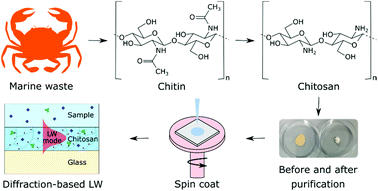A study of diffraction-based chitosan leaky waveguide (LW) biosensors
Abstract
The waveguide layer of diffraction-based leaky waveguides (LWs) must be made of materials that have low refractive index, are permeable to analytes, can be deposited by spin coating, and can be functionalised and crosslinked. These requirements are fulfilled by thin films of chitosan hydrogels. In this work, we studied the reproducibility of diffraction-based LWs with chitosan waveguides. The average refractive index sensitivity (RIS) and RI limit of detection (LOD) of the eight devices investigated herein were 125.5 ± 3.8 deg RIU−1 and 1.9 × 10−6 ± 1.3 × 10−6 RIU, respectively. While several challenges associated with the realisation of reproducible chitosan LWs have been addressed, reducing the variations in RI LOD requires improving the adhesion of chitosan films to glass substrates, minimising bubbles trapped in microfluidic channels, and using pumps with minimal pulsations. We showed that the buffer baseline of LWs with unmodified chitosan before and after introducing 750 μM bovine serum albumin (BSA), which is equal to the physiological levels of serum albumin, was different by 3.6%. Nevertheless, using biotin, anti-biotin antibody and BSA as exemplar recognition element, analyte and interferent, respectively, we demonstrated that diffraction-based chitosan LWs were suitable for monitoring analyte-RE binding in the presence of 750 μM BSA.

- This article is part of the themed collection: 150th Anniversary Collection: Microfluidics


 Please wait while we load your content...
Please wait while we load your content...